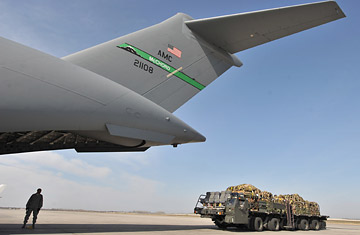
A cargo plane bound for Afghanistan sits on the tarmac at the Transit Center at Manas in Kyrgyzstan
Kyrgyzstan is as strange as the sound of its name. For one thing, it's the only nation in the world to host military bases for both the U.S. and Russia. And while it sought — and eventually won — a nearly fourfold rent increase from the Pentagon last year for continued American use of the Manas air base, outside the capital, Bishkek, there was another condition: that the U.S. military stop calling it a base. The U.S. agreed, and so since last summer the busy hub has been officially known as the Transit Center at Manas — a Greyhound bus terminal for central Asia and the U.S. war in Afghanistan.
While U.S. flights into and out of the, uh, transit center were initially suspended following the violent ousting of President Kurmanbek Bakiyev on Wednesday, April 7, limited operations into Afghanistan have resumed, Pentagon officials said Thursday. Acting Prime Minister Roza Otunbayeva has said U.S. operations there can continue for now, although some of her fellow opposition leaders want the U.S. lease terminated or at least shortened.
If those who toppled the Kyrgyzstan government on Wednesday decide to evict the U.S. military in the days to come, the current surge of U.S. troops into Afghanistan will be slowed, but it won't be stopped. Those who have taken power, many of them friendly to Moscow, didn't like how the U.S. dealt with Bakiyev during lease-renewal negotiations last spring, believing that the Obama Administration had legitimized an autocratic regime. Still, the country appreciated the increased rent — from $17 million to $63 million annually — as well as a U.S. pledge to spend a further $67 million improving the airport, which serves as Kyrgyzstan's key international gateway.
Russia's influence is extensive in the former Soviet republic, and Moscow has been irritated by the U.S. presence in what it calls its "near abroad" — former Soviet territories — since the U.S. began operations at Manas in 2001. In Moscow in February 2009, perhaps spurred by the offer of a $2 billion loan from Russia, Bakiyev publicly complained that the U.S. wasn't paying enough for its use of the base. That same month, the Kyrgyz parliament voted to end the U.S. presence, though ultimately the lease was renewed with the hefty rent increase.
Although Manas is "very essential" to U.S. operations in Afghanistan, "we obviously have other options," Air Force General Duncan McNabb, chief of the U.S. Transportation Command, said last December. While most U.S. troops arrive in Afghanistan via Manas, only about 20% of their cargo does; roughly half travels overland through Pakistan, and the rest arrives from the north via rail and truck lines, largely through Tajikistan and Uzbekistan. If the U.S. were to lose Manas, U.S. officials would likely seek a replacement base in the vicinity and explore options in Azerbaijan, Georgia or Uzbekistan. But U.S. officials believe that Kyrgyzstan's poverty — rioting over increased utility prices played a key role in Bakiyev's ouster — creates an incentive for the country to retain its U.S. tenant.
As part of President Obama's plan to send 30,000 more troops into Afghanistan by the fall, more than 1,500 U.S. soldiers cycle through the base every day, either heading into or out of Afghanistan. Flights between Manas and Afghanistan employ Air Force C-17 and other military aircraft, while those from Manas to Europe use commercial airliners. Beyond its bus-terminal mission, it's key to airlifting supplies into and evacuating wounded troops from Afghanistan. Air Force KC-135 aerial refueling tankers are also based at Manas.
Officials said Thursday that U.S. humanitarian missions conducted in and around Bishkek, like a recent deworming conference in which U.S. military doctors participated, had been placed on hold until the situation settles down. Pentagon officials said there was no apparent threat to the roughly 1,000 mostly American troops at the Manas, which is located 16 miles (26 km) northwest of Bishkek. The Pentagon plainly has no intention of leaving, even though the current yearlong lease expires in July. During the past month alone, it has issued solicitations seeking to award paving, janitorial and shuttle-bus contracts. It's also seeking to buy airplane-handling equipment, computers, tools and inflatable maintenance shelters for the transit center.
